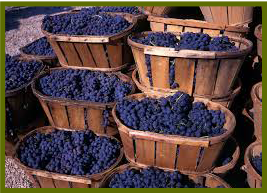Pre-Historic Period
 Wine is far older than recorded history and could date back over 20 million years ago as fermenting yeasts evolved together with fruit bearing flowering plants ─ in ancient times, wine was considered to be a magical, spontaneous gift of nature
Wine is far older than recorded history and could date back over 20 million years ago as fermenting yeasts evolved together with fruit bearing flowering plants ─ in ancient times, wine was considered to be a magical, spontaneous gift of nature
There are many etiological myths told about the first cultivation of the grapevine and fermentation of wine.
The Biblical Book of Genesis first mentions the production of wine following the Great Flood, when Noah drunkenly exposes himself to his sons. The resulting Curse of Ham was originally intended as a justification for the Hebrew conquest of Canaan but was later adapted to explain black skin and African slavery.
Modern Era
 European grape varieties were first brought to what is now Mexico by the first Spanish conquistadors to provide the necessities of the Catholic Holy Eucharist. Planted at Spanish missions, one variety came to be known as the Mission grape and is still planted today in small amounts. Succeeding waves of immigrants imported French, Italian and German grapes, although wine from those native to the Americas (whose flavors can be distinctly different) is also produced.
European grape varieties were first brought to what is now Mexico by the first Spanish conquistadors to provide the necessities of the Catholic Holy Eucharist. Planted at Spanish missions, one variety came to be known as the Mission grape and is still planted today in small amounts. Succeeding waves of immigrants imported French, Italian and German grapes, although wine from those native to the Americas (whose flavors can be distinctly different) is also produced.
Mexico became the most important wine producer starting in the 16th century, to the extent that its output began to affect Spanish commercial production. In this competitive climate, the Spanish king sent an executive order to halt Mexico’s production of wines and the planting of vineyards.